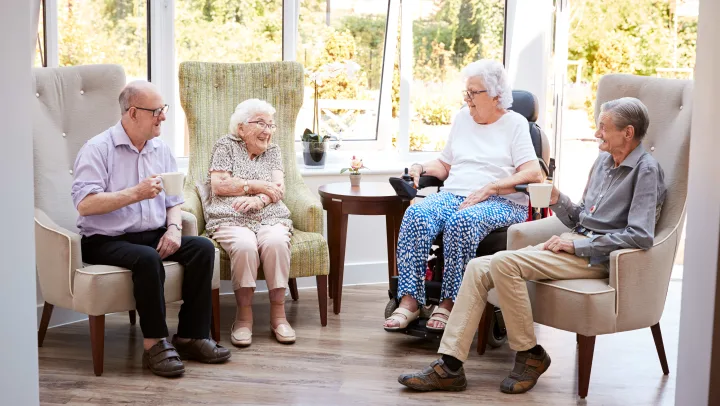Understanding Just How Helped Living Sustains Clients With Dementia Treatment Demands
Assisted living facilities are increasingly acknowledged for their pivotal function in dealing with the complex treatment requirements of patients with dementia. By offering an organized yet nurturing atmosphere, these facilities not only advertise security and well-being but also foster a feeling of autonomy via personalized treatment plans.
Review of Dementia Treatment
Dementia care is increasingly essential as the prevalence of dementia-related problems rises among aging populations. The problem can vary substantially in its discussion, requiring tailored care methods to fulfill individual needs.
Reliable dementia care includes a multidisciplinary strategy, including clinical, emotional, and social support. Health care experts, caregivers, and member of the family should work together to produce a nurturing environment that promotes the well-being of individuals with mental deterioration. Key components of dementia care consist of personalized care strategies, cognitive excitement therapies, and behavioral treatments focused on boosting top quality of life.
In addition, it is vital to acknowledge the emotional and psychological obstacles faced by both clients and caregivers. Education and training for caretakers play a critical duty in fostering understanding and compassion, therefore enhancing communications with those influenced by mental deterioration. As the demand for mental deterioration care remains to rise, the emphasis needs to stay on delivering compassionate, person-centered treatment that appreciates the self-respect and preferences of individuals coping with this condition.
Role of Assisted Living Facilities
Helped living facilities play a crucial function in offering treatment for people with mental deterioration, supplying an encouraging setting that balances self-reliance with the required assistance. These facilities are made to cater to the special demands of homeowners, advertising a sense of community while guaranteeing safety and security and wellness.
In an assisted living setting, qualified team member provide 24/7 support, aiding with day-to-day activities such as bathing, clothing, and medicine management. This level of care is essential for individuals with mental deterioration, who might battle with these tasks due to cognitive decrease. Furthermore, centers usually integrate memory-enhancing programs and social activities customized to stimulate cognitive functioning and motivate social communication.
The physical atmosphere of nursing home is additionally optimized for safety and security, including secure entries, well-lit paths, and clear signs to aid locals browse their surroundings. Furthermore, these communities promote a sense of belonging, minimizing the feelings of seclusion that individuals with mental deterioration may experience.
Personalized Treatment Plans
To make sure that each resident receives one of the most proper treatment, personalized care strategies are necessary in assisted living centers for people with dementia. These plans are customized to meet the distinct requirements, choices, and difficulties faced by each citizen, advertising their self-respect and quality of life.
The advancement of a personalized care plan commonly starts with a thorough evaluation performed by medical care professionals. Assisted Living. This analysis assesses the individual's cognitive capabilities, physical wellness, psychological well-being, and social choices. Input from member of sites the family and the resident themselves is essential, as it gives important insights into their background, regimens, and personal rate of interests
When the analysis is full, a multidisciplinary group works together to develop a treatment strategy that details particular objectives and treatments. This might consist of medicine administration, daily living aid, and behavior methods customized to alleviate anxiety or frustration.
Regular reviews and updates to the treatment strategy ensure it remains pertinent as the person's problem evolves. Memory Care. By prioritizing customized treatment, assisted living facilities can boost the total well-being of residents with mental deterioration, cultivating a setting that appreciates their originality while resolving their treatment needs effectively
Engaging Tasks and Socialization
Engaging tasks and socializing play a vital role in boosting the lifestyle for locals with dementia in assisted living centers. These tasks are developed to stimulate cognitive feature, promote emotional wellness, and foster links among residents. Organized programs, such as art treatment, songs sessions, and reminiscence treatment, offer possibilities for individuals to reveal themselves artistically while also causing positive memories.
Socialization is equally critical, as it deals with feelings of isolation and solitude that can go along with dementia. Group tasks, including video games, group trips, and public eating, urge interaction and assistance residents develop supportive partnerships with peers and caregivers. This sense of area not only enhances their day-to-day experiences but also contributes to a much more secure emotional atmosphere.
Furthermore, engaging tasks can be customized to individual choices and cognitive degrees, making sure that each local can take part meaningfully. By developing an environment that prioritizes involvement and social communication, aided living facilities can considerably improve residents' general psychological wellness, cultivating a sense of objective and belonging. Inevitably, these initiatives are vital elements of detailed dementia care, considerably affecting citizens' general health and happiness.
Benefits of Community Support

In addition, neighborhood assistance promotes social communication, which is crucial for cognitive and emotional health. Involving with peers and taking part in team activities can enhance state of mind and motivate reminiscence, adding to a greater feeling of belonging. This social involvement is vital, as loneliness and seclusion can exacerbate cognitive decrease.

Verdict
In verdict, aided living centers offer as vital atmospheres for individuals with dementia, providing structured support that fosters both independence and safety. The application of individualized treatment strategies makes sure that each homeowner's special demands are fulfilled, while involving activities promote social interaction and cognitive involvement.
Comments on “Explore high-quality Memory Care programs designed for cognitive health.”